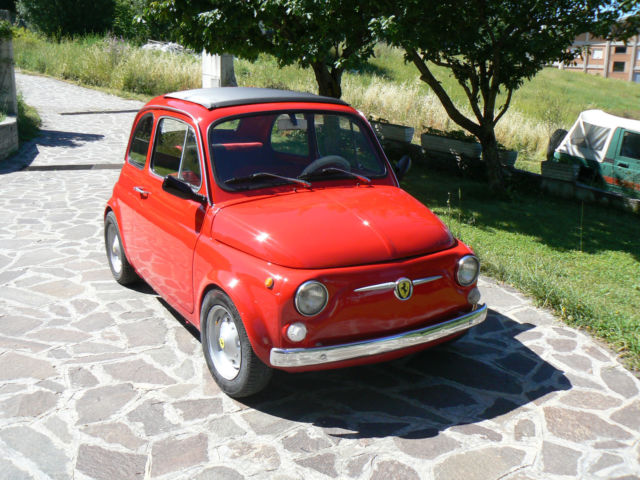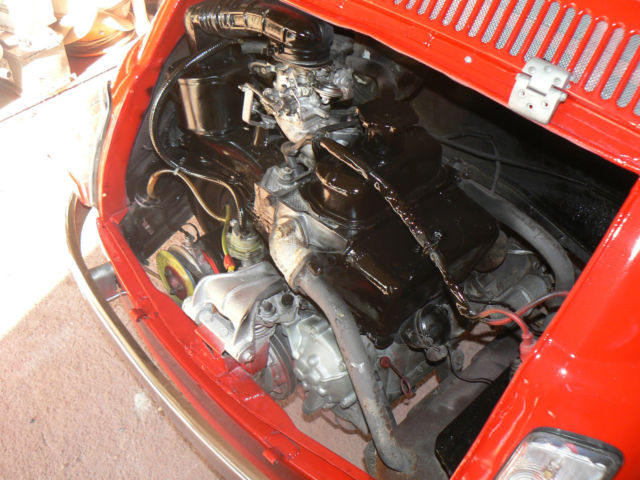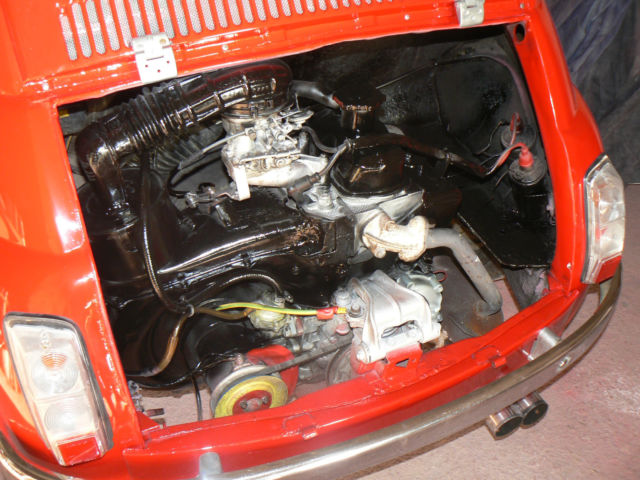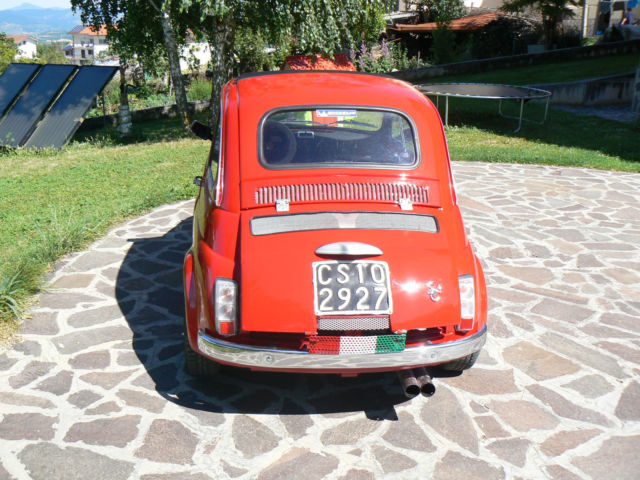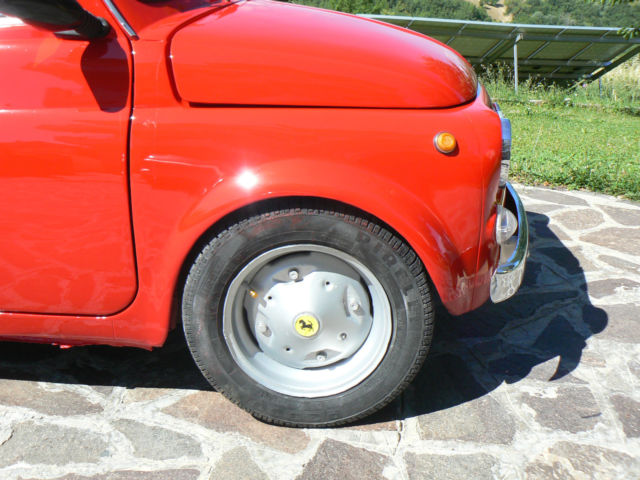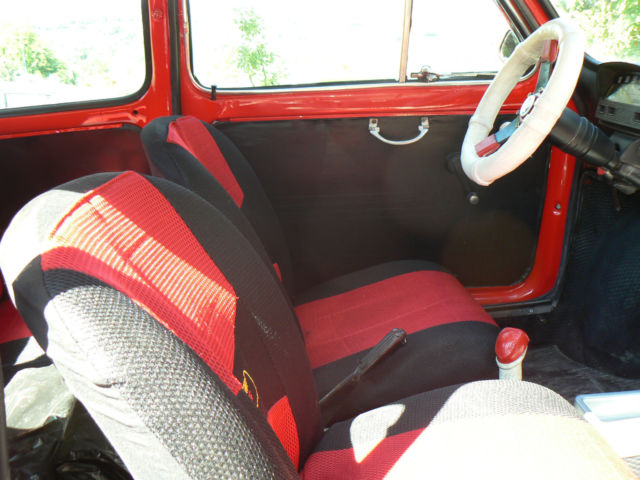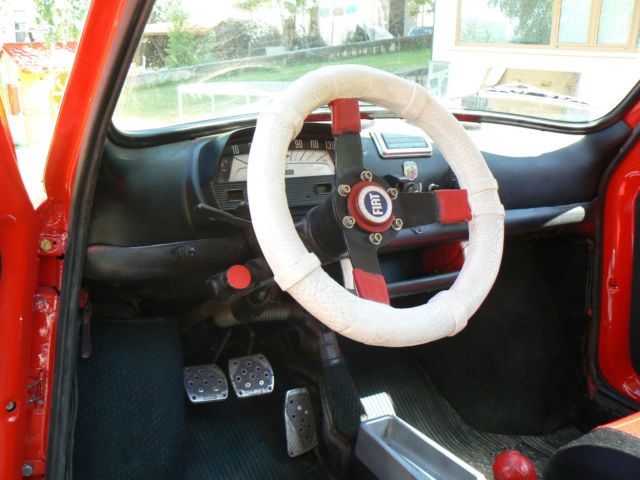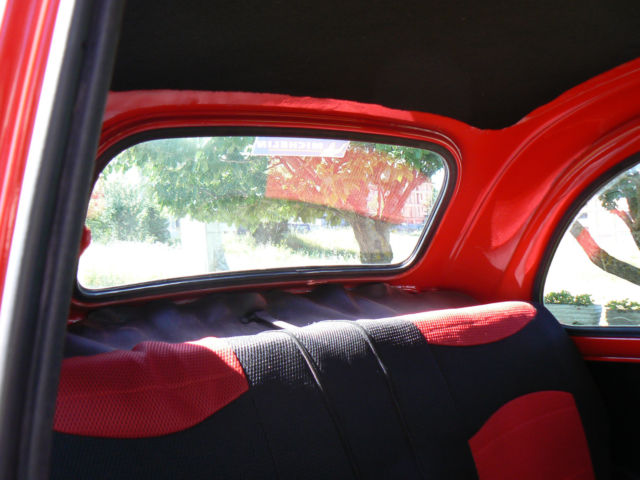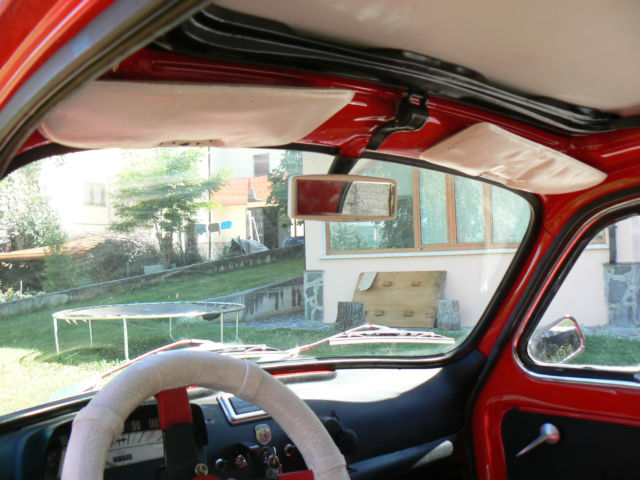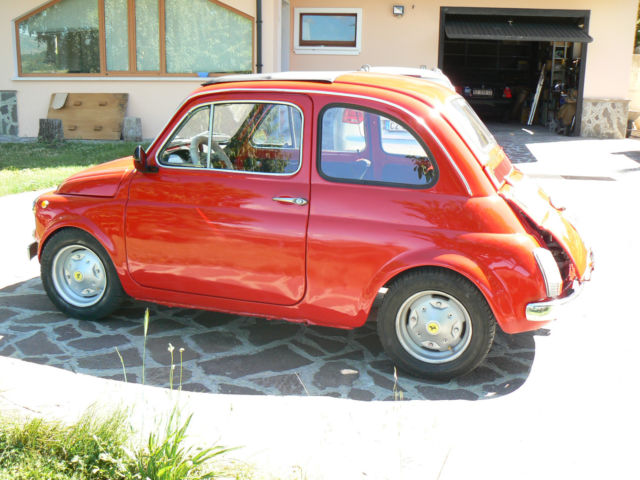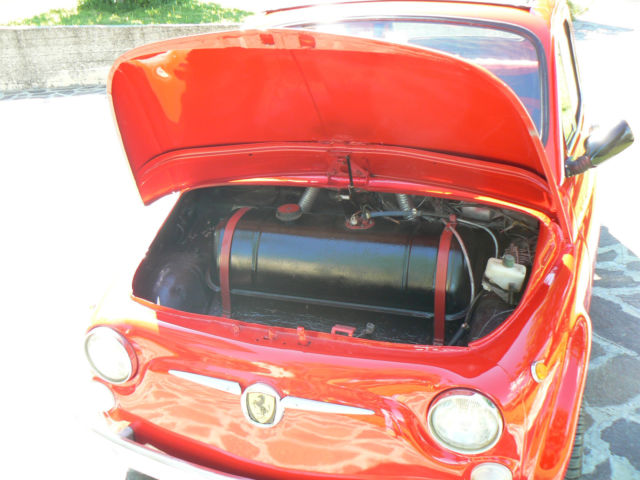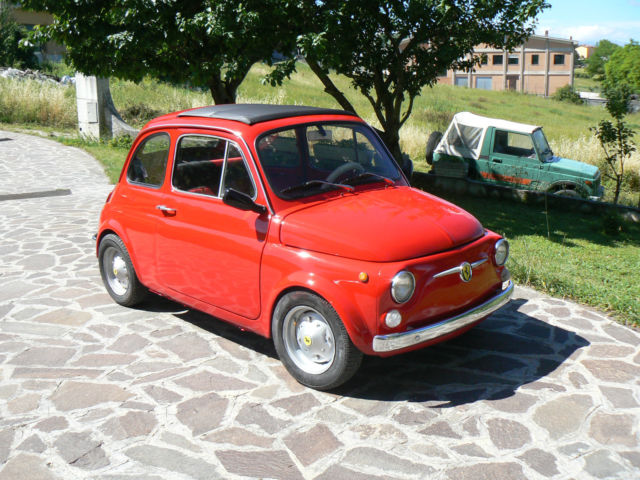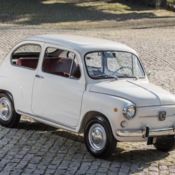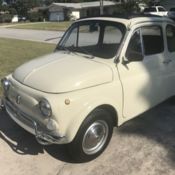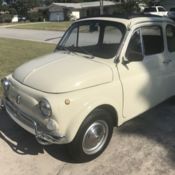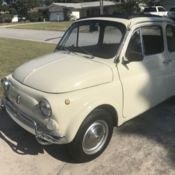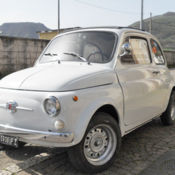1970 FIAT 500 L, JUST RESTORED, NO RESERVE!
Technical specifications of Fiat 500 1970
| Price: | - |
|---|---|
| Condition: | Used |
| Item location: | Kearny, New Jersey, United States |
| Make: | Fiat |
| Model: | 500 |
| Type: | Hatchback |
| Year: | 1970 |
| Mileage: | 0 |
| Color: | Red |
| Engine size: | 650CC |
| Number of cylinders: | 2 |
| Fuel: | Gasoline |
| Transmission: | Manual |
| Drive type: | FWD |
| Interior color: | Red |
| Options: | Convertible |
| Vehicle Title: | Clear |
| You are interested? | Contact the seller! |
Description
1970 Fiat 500 110L, upgraded motor 650cc. Just finished restoration.Chassis number: 2790548NO RESERVE !
BID TO WIN !
The car for sale was produced in Italy in 1970 and had a complete mechanical and body work restoration finished last month (2016). The end-result is spectacular.
Since its 2016 restoration, the car has covered 0 MILES/KMS.
She runs perfectly, with all switches and gauges working properly, it is a great fun to drive.The car is also registered with ASI, the official Italian Historic Vehicle Register that accepts only vehicles with 100% original parts, and high standard renovations.
On request we can provide other info and more photos.
NO RESERVE ! BID TO WIN !
Please note, we reserve the right to end this auction at any time
For any questions, please call Robert (US Partner/Agent) @ 415-902-6429
Please do NOT bid if you are not serious, OR, don't have the money! We are not here towaistour time. Serious buyers/collectors please. If you do win this auction and then decide to "pull a fast one" and not pay, we will immediately contact Ebay Motors and report you. Your Ebay account will be terminated.
IMPORTANT INFO:
The car is currently in Italy but custom clearance, duties, and shipping to New York are included in the final selling price.
* Once payment is settled, we will take care at our own expenses of shipping the car with a container to the port of New York.
* Customs clearance will also be at our expense and a full set of original documents will be provided to insure a quick registration with the US DOT.
This is a $4,000 savings/car!
* The buyer will only have to take care of shipping from our warehouse in New Jersey to the final destination in the US.
* Delivery time to New Jersey is estimated to be between 20 to 30 days from payment.
* We will be glad to provide quotes for shipping in Europe, South America, Japan, Asia, and Australia. Just send us an email.
** We accept payments through PayPal for deposit only. Remaining balance via bank wires, through our U.S. Bank account.
Buy as an investment:
The value of this car for hagerty.comMODEL OVERVIEWHistory of the 1957-1975 Fiat 500The Fiat 500 of 1957 was Italy’s answer to the Volkswagen Beetle. Philosophically, the Nuova (new) 500 was the descendant of the 1936 Topolino (Little Mouse) but it was even smaller, with only a 72-inch wheelbase. The pre-war Topolino had a front-mounted four-cylinder engine of 570 cc and it was water-cooled, while the 1957 Nuova 500 boasted a rear-mounted, vertical two-cylinder, air-cooled engine.
The Nuova 500’s engine displaced 479 cc, and developed 13 horsepower, and the car rode on independent suspension. The gearbox was un-synchronized and required skill and double-clutching to negotiate successfully. Initially with two seats, and a soft top which included a plastic back window that rolled down, the 500 was able to deliver 50 mpg with a top speed of 50 mph.
Representing the smallest possible family vehicle, the little Fiat 500 joined the slightly larger water-cooled 600 and the Vespa and Lambretta scooters in putting many Italians back on the roads following World War II. Almost immediately, open beach car versions of both models with wicker seats – Fiat Jollys – were launched, and proved a huge hit.
When the 500D model was introduced in 1960, it had gained a small back seat and the engine size was boosted to 499 cc. It developed 17 horsepower, but the little car still took 59 seconds to get to 50 mph. The back window was now fixed and the soft top only opened to top of the window.
The little 500 got a station wagon variation in 1960, the Giardiniera. The wheelbase was extended by four inches and the engine laid on its side, under a trap door in the rear floor. The rear door was side-hinged and the sunroof was full-length. After 1968, these were built by Autobianchi and badged as such, and they were built until 1977, outlasting the sedan.
The 1965 Fiat 500F gained forward-hinged doors a bigger windshield and plusher interior, but still rolled on tiny 12-inch tires. The 500L of 1968 was a luxury edition and cars from 1972 had a 594 cc engine.
The Fiat 500 was always a huge seller in Europe, with nearly 3.5 million in 18 years, but they were not sold in the U.S. after 1961, since a 9-foot 9 inch-long, 1,070-pound car with a 50 mph top speed was too frightening to contemplate on American roads. Genuine U.S. imports are easy to recognize since they had seven-inch headlights grafted onto the nose, replacing the five-inch European lights.
Fiat Jollys tend to be the most collectible variant of the 500 series, and they typically bring strong money, especially at auction. Giardinieras are generally the next most sought-after 500. Outside of accident damage, which is usually terminal, the Fiat 500’s big enemy is rust, with floors being particularly problematic. With so many Fiat 500s built, parts aren’t too difficult to find, however the youngest 500 you can buy is now 37 years old, and finding a good one could be a challenge.
">The Fiat 500 of 1957 was Italy’s answer to the Volkswagen Beetle. Philosophically, the Nuova (new) 500 was the descendant of the 1936 Topolino (Little Mouse) but it was even smaller, with only a 72-inch wheelbase. The pre-war Topolino had a front-mounted four-cylinder engine of 570 cc and it was water-cooled, while the 1957 Nuova 500 boasted a rear-mounted, vertical two-cylinder, air-cooled engine.
The Nuova 500’s engine displaced 479 cc, and developed 13 horsepower, and the car rode on independent suspension. The gearbox was un-synchronized and required skill and double-clutching to negotiate successfully. Initially with two seats, and a soft top which included a plastic back window that rolled down, the 500 was able to deliver 50 mpg with a top speed of 50 mph.
Representing the smallest possible family vehicle, the little Fiat 500 joined the slightly larger water-cooled 600 and the Vespa and Lambretta scooters in putting many Italians back on the roads following World War II. Almost immediately, open beach car versions of both models with wicker seats – Fiat Jollys – were launched, and proved a huge hit.
When the 500D model was introduced in 1960, it had gained a small back seat and the engine size was boosted to 499 cc. It developed 17 horsepower, but the little car still took 59 seconds to get to 50 mph. The back window was now fixed and the soft top only opened to top of the window.
The little 500 got a station wagon variation in 1960, the Giardiniera. The wheelbase was extended by four inches and the engine laid on its side, under a trap door in the rear floor. The rear door was side-hinged and the sunroof was full-length. After 1968, these were built by Autobianchi and badged as such, and they were built until 1977, outlasting the sedan.
The 1965 Fiat 500F gained forward-hinged doors a bigger windshield and plusher interior, but still rolled on tiny 12-inch tires. The 500L of 1968 was a luxury edition and cars from 1972 had a 594 cc engine.
The Fiat 500 was always a huge seller in Europe, with nearly 3.5 million in 18 years, but they were not sold in the U.S. after 1961, since a 9-foot 9 inch-long, 1,070-pound car with a 50 mph top speed was too frightening to contemplate on American roads. Genuine U.S. imports are easy to recognize since they had seven-inch headlights grafted onto the nose, replacing the five-inch European lights.
Fiat Jollys tend to be the most collectible variant of the 500 series, and they typically bring strong money, especially at auction. Giardinieras are generally the next most sought-after 500. Outside of accident damage, which is usually terminal, the Fiat 500’s big enemy is rust, with floors being particularly problematic. With so many Fiat 500s built, parts aren’t too difficult to find, however the youngest 500 you can buy is now 37 years old, and finding a good one could be a challenge.
1972 Fiat Nuova 500 Info- 0" >
- Body Styles
- 2dr Coupe
- 0" >
- Engine Types
- 4-cyl. 499cc/22hp 1bbl
CURRENT & HISTORICAL VALUESView current vehicle values and see how they’ve changed over time in 3-year, 5-year and to-date intervals. Compare these values to other vehicles and benchmark financial indices.
Current Values
- #1 Concours$34,400Condition #1 vehicles are the best in the world. The visual image is of the best vehicle, in the right colors, driving onto the lawn at the finest concours. Perfectly clean, the vehicle has been groomed down to the tire treads. Painted and chromed surfaces are mirror-like. Dust and dirt are banned, and materials used are correct and superbly fitted. The one word description for #1 vehicles is "concours."
- $26,000#2 vehicles could win a local or regional show. They can be former #1 vehicles that have been driven or have aged. Seasoned observers will have to look closely for flaws, but will be able to find some not seen by the general public. The paint, chrome, glass and finishes will all appear as excellent. No excessive smoke will be seen on startup, no unusual noises will emanate from the engine. The vehicle will drive as a new vehicle of its era would. The one word description for #2 vehicles is "excellent."
- $19,600#3 vehicles could possess some, but not all of the issues of a #4 vehicle, but they will be balanced by other factors such as a fresh paint job or a new, correct interior where applicable. #3 vehicles drive and run well, but might have some incorrect parts. These vehicles are not used for daily transportation but are ready for a long tour without excuses, and the casual passerby will not find any visual flaws. "Good" is the one word description of a #3 vehicle.
- $12,500#4 vehicles are daily drivers, with flaws visible to the naked eye. The chrome might have pitting or scratches, the windshield might be chipped. Paintwork is imperfect, and perhaps the body has a minor dent. Split seams or a cracked dash, where applicable, might be present. No major parts are missing, but the wheels could differ from the originals, or other non- stock additions might be present. A #4 vehicle can also be a deteriorated restoration. "Fair" is the one word that describes a #4 vehicle.
- this car auction is grade 2 and therefore its value is$ 26,000
